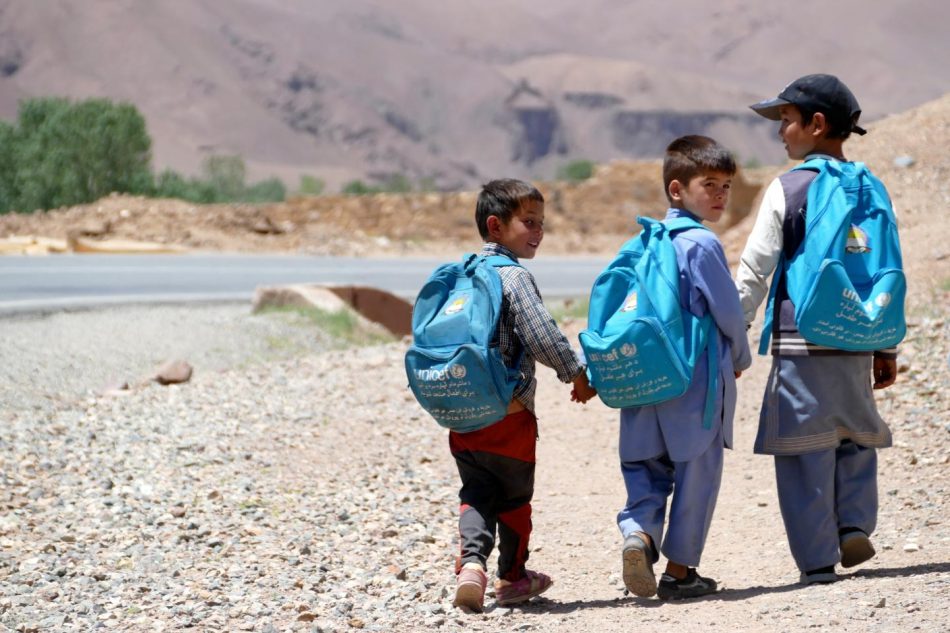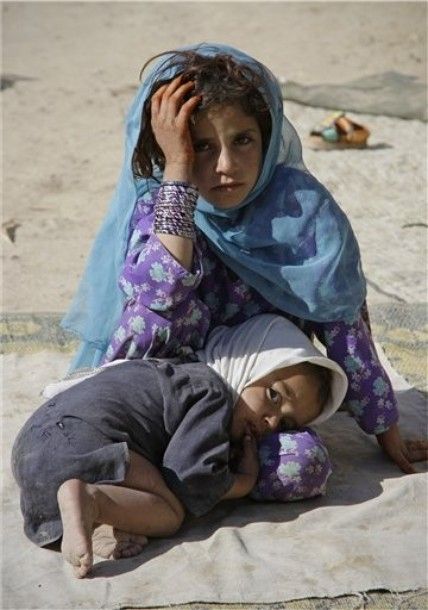


1 Children of Conflict: Afghanistan (part 1)
6 mei 2007
2 Children of Conflict – Afghanistan – Part 2
6 mei 2007
3 Educating women in Afghanistan | Shabana Basij-Rasikh | TEDxInstitutLeRosey
22 nov. 2017
4 “The faces of the children have stuck with me”: reporting on the Taliban takeover in Afghanistan..
1 dec. 2021
5 Afghanistan in the 1950s: Back to the Future [Full Documentary] – BBC News
In première gegaan op 22 aug. 2021
Content licensed from Espresso Media. Any queries, please contact us at: owned-enquiries@littledotstudios.com
Produced by Love Thy Films
6 Meet The Real People Of Afghanistan (2014)
24 aug. 2016
7 A Brief History of Afghanistan: SFU Continuing Studies lecture
12 mei 2012
8 Afghanistan: The Unknown Country (Full Documentary) | TRACKS
27 jul. 2019
Any queries, please contact us at:
9 Unholy War: Into Afghanistan (Afghanistan Documentary) | Real Stories
3 jan. 2018
10 
9 aug. 2013
Afghanistan: Crystal Dreams
Over the past four decades, Afghanistan has been in an almost constant state of warfare or internal conflict – enduring Soviet occupation, the rule of the Taliban and a Western-backed authority.
As leaderships and ideologies have changed, loyalties also have fragmented.
But in the remote Jegdaleki region in the Hindu Kush mountains, life for one group of people has continued largely undisturbed.
For generations these tough, resilient villagers have risked life and limb, to mine deep into the barren earth in pursuit of prized red rubies.
These jewels are then illicitly traded across the border to Peshawar, Pakistan, to be cut and polished. From there, they are sold all over the world, adorning royalty and the wealthy.
But as foreign troops withdraw and the Taliban’s presence spreads, Jegdalek’s ruby miners are drawing attention.
Generations of men have lived and died for the wealth buried in the jagged mountains of Sappar, Afghanistan, chasing crystal dreams with dynamite and pick axes.
With the country almost entirely dependent on foreign aid, the precious rubies have become a potential windfall for the government but most of the gems are smuggled out to Pakistan to be processed and sold abroad.
Forces within the country, lured by the temptation of wealth, have begun to compete for control of the mines.
Attempts have been made by the central government to harness the mining of the rubies and other interested parties are not far behind them.
101 East examines the lives of Afghanistan’s ruby miners and the lure of the red crystals as the country approaches an uncertain and turbulent future.
11 Life Behind The Burqa In Afghanistan
9 sep. 2016
Afghanistan is often depicted as a Middle Eastern country that requires women to wear burqas in public, but the real story here is actually much more complicated than that. Photojournalist Paula Bronstein spent 15 years documenting life in Afghanistan, and tells Seeker Stories how women are finding their voice.
12 Women in Afghanistan
16 jun. 2011
13 Afghan women concerned about resurgent Taliban
8 mrt. 2020
14 Afghanistan: No Country for Women | 101 East
3 jul. 2015
Thirteen years after the fall of the Taliban, women in Afghanistan continue to suffer oppression and abuse.
Research by Global Rights estimates that almost nine out of 10 Afghan women face physical, sexual or psychological violence, or are forced into marriage.
In the majority of cases the abuse is committed by the people they love and trust the most – their families.
While shelters are trying to provide protection and legal help to some, many women return to abusive homes because there is no alternative. Unable to escape their circumstances, some are turning to drastic measures like self-immolation to end their suffering.
Has enough progress been made on women’s rights in Afghanistan since the fall of the Taliban? Share your thoughts with us @AJ101East.
IMPORTANT CONTENT
15 Child trafficking in Afghanistan | DW Documentary
Back to menu IMPORTANT CONTENT Must be seen
15 aug. 2022
Cut from Different Cloth: Burqas & Beliefs (2005)
In 2005 filmmakers Olga Shalygin and Cliff Orloff returned to Afghanistan’s northern city of Mazar-I-Sharif for the third time since the fall of the Taliban in 2002.
Despite a growing network of Afghan friends and colleagues from their two prior visits, they had been restricted in their ability to meet freely with Afghan women.
The all-covering burqa, the high-walled living compounds and cultural restrictions on women limited their access. Olga, a Pulitzer Prize-winning photojournalist, was puzzled why virtually all the Afghan women she saw still wore the burqa…even though security had greatly improved and a new constitution was adopted that granted women equal rights with men.
Through Serena, a 27-year-old American woman, who is living with an Afghan family and their 27-year-old daughter Hasina, we are taken inside the walls that separate women from men. Serena becomes the eyes and ears of the filmmakers.
Together, Serena, Hasina and Olga set out on a journey to learn what it means to be a woman in today’s Afghanistan. As their journey progresses, Serena’s desire to respect Afghan culture and tradition comes into conflict with her belief in universal rights for women. From interviewing child brides to women in prison, Serena comes to understand the risks Hasina and other Afghan women take to assert their rights.
16 Afghanistan: Kabul under the Taliban | DW Documentary
1 nov. 2021
17 Sosan’s Story: Domestic Violence in Afghanistan
26 aug. 2009
18 Dangerous Love (Domestic Abuse Documentary) | Real Stories
10 jul. 2017
23 jul. 2014
 #whiteribbon
#whiteribbon20 Assignment Asia: Life for Afghan returnees
26 jun. 2017
21 Al Qaeda’s Fight In Afghanistan (2011)
7 sep. 2016
22 MISSION AFGHANISTAN | Documentary Film
2 mei 2013
There is fear and desperation in their empty eyes. They have no livelihood and no work; and their growing children receive no education. Their daughters do not have much hope of finding suitable matches; and they are not certain where the next meal would come from. Many women and children live in Gurdwaré, Sikh place of worship relying on free kitchen
And so, a young adventurous Afghan Sikh, Pritpal Singh, who had left Afghanistan 2 decades ago, set out from the UK to document the suffering of fellow Afghan Sikhs and Hindus communities in Afghanistan. The film “MISSION AFGHANISTAN” portrays the life and hardships of minorities in War-torn Afghanistan.”
Those who could afford it, left the country. Those left behind have hardly any means of support. They have no present and no future.
These are Sikh women with children, widows and families left behind in a war-riven Afghanistan. Together with the Hindu community, their numbers are dwindling, as they live from day to day in many towns in Afghanistan. The situation of women is made worse because this is a conservative country where women are confined to walled enclosures and cannot go out to work.
Even Gurdwaré of great historical significance are in a state neglect and disrepair.
The country has been torn apart by war for decades and peace is not in sight when the Americans, British and other foreign (NATO- ISAF) troops leave. For minorities like the Sikhs and Hindus, the situation is quite hopeless. As a Sikh lady points out in the documentary, they cannot just depend on short term handouts by generous Sikhs from abroad.
The need is for sustained support projects which set up schools and also provide work for the poorer Sikhs in Afghanistan. Much can be done by the more prosperous business Afghan Sikhs who are doing well in Sikh diaspora countries like the UK, Germany, India, UAE & US.
Pritpal had only a very limited budget. The main advantage of this low budget but professionally produced documentary was that, with one local cameraman, and dressed as an Afghan fluent in Farsi & Hindko, Pritpal was able to merge and mix with communities, and keep a low profile in a highly dangerous environment. Travelling on mined countryside roads, strewn with destroyed army vehicles, he was able to film remote places and intermingle with communities in a war zone. This is a country where tourists make attractive targets for hostage-taking by terrorists, and filming crews have to travel with convoys.
Pritpal returned from this dangerous mission with, in his words, “The treasure of well over 1500 photographs and films of key historical Gurdwaré, Mandir & Mosques of Afghanistan – something which has never been done in past!”
He travelled to Kabul, Jalalabad, Sorkhrod, Agha Sarai, Charikar, Salang and Ghazni.
Truly, his mission to bring out the truth about the desperate condition of his fellow Sikhs in a country where their forefathers lived for thousands of years, is a remarkable achievement. He loves his country of birth and is concerned that “if they migrate to other countries, our history and our historical sites will vanish”.
It is a highly informative journalistic documentary. In Hindko, English, Farsi, Panjabi & Pashto with English subtitles.
23 The People Of Afghanistan (Demography)
18 dec. 2013
24 Fortunate Street Children of Afghanistan – Documentary
7 jan. 2017
25 Street working children
19 nov. 2014
26 CIA-Backed Afghan Death Squads Massacred Children Inside Religious Schools in Campaign of Terror
18 dec. 2020
27 Who are the Taliban? | Start Here
30 mei 2021
28 Afghan Child Labor Documentary
24 feb. 2013
29 Unnoticed: Children of Kabul – Preview Tape
19 feb. 2011
30 AFGHANISTAN: EXTREME POVERTY
Back to menu
21 jul. 2015
(27 Dec 2000) English/Nat
For two decades, Afghanistan has been torn apart by war and extreme poverty, and its people’s anguish has been exacerbated of late by the worst drought in years and a bitterly cold winter.
The World Food Programme says as many as one (M) million Afghans face the possibility of starvation this winter because of the drought, which destroyed 75 percent of the country’s crops and about 50 percent of the livestock.
Word of fresh U-N sanctions against the ruling Taliban has done nothing to ease the situation and it is feared that it’s Afghanistan’s children who will bear the brunt of the country’s misery.
With medical supplies rapidly dwindling and food and fuel prices soaring, statistics indicate that only one quarter of Afghan youngsters will see their fifth birthday.
The Indira Gandhi Institute of Child Health is the main children’s hospital in Afghanistan’s capital, Kabul.
Here, international aid donors have been helping to heat the wards.
This baby, born premature, is lucky to find itself in a warm incubator.
The hospital’s director complains that there aren’t enough of these machines.
Most of Afghanistan is in distress from severe drought, causing malnutrition and starvation in children, as well as mass migration among families searching for food, water and employment.
This month, the U-N Security Council voted to impose sweeping new sanctions on the ruling Taliban militia if it does not hand over Saudi dissident Osama bin Laden and close alleged terrorist camps in the country.
The U-N resolution calls for an arms embargo against the Taliban, bans international travel by Taliban officials, closes Taliban offices outside the country and further restricts international flights.
While the sanctions are meant to target only the Taliban and not the impoverished people of Afghanistan, the country’s people say the measures will isolate them further – and couldn’t have come at a worse time.
Staff at the Indira Gandhi Institute of Child Health claim the sanctions will seriously affect their work and the Taliban say the threat of embargoes has already resulted in the death of numerous patients.
Although the sanctions are not economic, there is little doubt they will add to the misery being caused by the dire state of the Afghan economy.
The doctors in the children’s hospital receive a monthly salary of only 15 U-S dollars.
The hospital itself lacks money to provide many of the medicines, and parents are forced to buy their children’s medication from the local markets.
Many can’t afford the medication their children require.
SOUNDBITE: (English)
“I have seen many families not able to get this medication form the bazaar. And they took their children back to their homes.”
SUPER CAPTION: Dr Mustafa Zamaray, Chief of Paediatric Ward, Indira Gandhi Institute of Children’s Health
The doctors are doing their best.
Every possible means is used to keep their young charges warm though the winter.
These children are the lucky ones, they have had the chance to at least receive proper medical care.
But for many in this war ravaged country, there is no opportunity to visit a hospital or clinic.
The impoverished nation of 26 (M) million depends heavily on foreign food and other supplies following 20 years of warfare and the worst drought in a generation.
This is the second year in succession without adequate water.
The task of collecting water for drinking and farming is never-ending.
Most water sources have dried up and children in drought-affected areas are forced to spend their days walking miles to fetch it.
31 Children and families in the Wakhan Valley Afghanistan
32 Canon 7d Afghan Kids on the streets of Kabul,
17 nov. 2014
33 Kabul – 5th fastest growing city in the world.
2 aug. 2016
34 The Poverty Gap is Expanding in Kabul
9 jun. 2016
Kabul is divided between the rich and poor, optimism and pessimism, development and disappointment. As entrepreneurs pump money into a steadily increasing economy, the poor are being left even further behind.
‘We want the fighting to stop and a Caliph, an Islamic state. If there was an Islamic state… there would be no need for foreigners to be here.” Says refugee Nandoy Mama. He and his family fled from the Helmand province when their tent was burnt down. Now Mama must fight off 70 people for water at his nearest well to make mud for a new house.
Meanwhile entrepreneur Farhad Ghafoor sips coffee at a 4-star hotel in Kabul. “It’s really a nice place where you can bring your guests and impress them.” After living in the US for several years Farhad returned to his homeland where he now runs a successful internet business. You have to have the vision. If you don’t have the vision, you never go ahead in life. Meanwhile, people like Mama are fighting to survive: “Why is it such a struggle just to fill our stomachs?”
SBS Australia – Ref. 4140
Journeyman Pictures is your independent source for the world’s most powerful films, exploring the burning issues of today. We represent stories from the world’s top producers, with brand new content coming in all the time. On our channel you’ll find outstanding and controversial journalism covering any global subject you can imagine wanting to know about.
35 Onboard the USS Roosevelt fighting Taliban forces | 60 Minutes Australia
28 aug. 2021
36 Should the US have stayed in Afghanistan longer? | The Bottom Line
27 aug. 2021
37 Obama’s War (full documentary) | FRONTLINE
18 aug. 2021
In “Obama’s War”, Correspondent Martin Smith interviews top generals, diplomats and government officials to understand the internal debates over President Obama’s grand attempt to combat terrorism at its roots. With the brunt of the work falling on rank-and-file soldiers in the unforgiving landscape of Helmand province, the Taliban stronghold in southern Afghanistan, FRONTLINE embedded with Echo Company of the 2nd Marines, 8th Battalion. Since the Marines’ arrival that July, Helmand had become the most lethal battlefield in Afghanistan. But FRONTLINE found the Marines trying to act as armed diplomats, attempting to build the necessary trust for badly needed economic development.
38 A Road Trip Through the Taliban Heartland – BBC Newsnight
16 aug. 2022
One year after the Taliban took control of Afghanistan, most girls secondary schools remain closed, poverty and malnutrition levels are rising. But the end of the Taliban insurgency also means the war-ravaged country is now more peaceful than it has been in decades.
BBC Pakistan and Afghanistan Correspondent Secunder Kermani travels across Afghanistan, starting at the town of Sangin, where more British soldiers were killed than any other, and then to Helmand, and Kandahar to investigate what life is now like for residents.
Secunder speaks to the Taliban Deputy Governor of Kandahar and those living under Taliban control. But as those who criticise the Taliban face arrest, or worse – does the fear remain?
Many are asking has the Taliban changed since they were last in power? But can the real change be seen in Afghanistan’s society?
Newsnight is the BBC’s flagship news and current affairs TV programme – with analysis, debate, exclusives, and robust interviews.
39 Abandoned – Afghanistan after the U.S. Occupation
In première gegaan op 28 aug. 2022
40 Afghanistan Special Report – Its People, Its Problems
31 aug. 2022
The United States ended the longest war in its history as it pulled out of Afghanistan in a hectic, and chaotic fashion.
The withdrawal did not end in bloodshed and created a power struggle within the country. The Taliban marched into Kabul and seized control of Afghanistan.
In what we hope is a thoughtful — thought-provoking look at the past year, CGTN’s Sean Callebs talks to the leaders in power and those most affected by the dramatic changes in the country –the poor, and women.
It has been a delicate balancing act for the Taliban… appeasing its ultra-conservative base and trying to forge its way in the 21st century. Its critics are many…at home, and abroad.
Here’s Afghanistan, – Its People, Its Problems.
sarita badhwar
11 maanden geleden